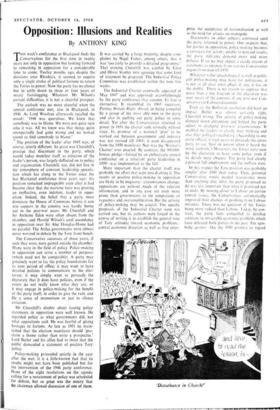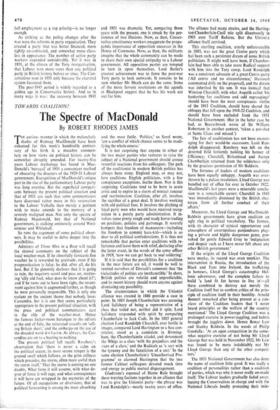Opposition: Illusions and Realities
By ANTHONY KING
THIS week's conference at Blackpool finds the Conservatives for the first time in twenty years not only in opposition but looking forward to remaining in opposition for a considerable time to come. Twelve months ago, despite the divisions over Rhodesia, it seemed to require only a single stroke of political fortune to return the Tories to power. Now the party has no choice but to settle down to three or four years of weary footslogging. Whatever Mr Wilson's current difficulties, it is not a cheerful prospect.
The outlook was no more cheerful when the annual conference met, also in Blackpool, in 1946. As Lcird Wootton afterwards recalled the mood: '1946 was querulous. We knew that somebody was to blame. We were not quite sure who it was. All we knew was that things quite unexpectedly had gone wrong and we looked round to find somebody to blame.'
The position of the leader after 1945 was, of course, utterly different. So great was Churchill's prestige that discontent in the party, which would today manifest itself as criticism of the leader's person, was largely deflected on to policy and organisation. Churchill, too, did not live in the atmosphere of constant leadership specula- tion which has clung to the Tories since the last Blackpool conference three years ago: his position remained impregnable even after it had become clear that the wartime hero was proving an ineffective, even indolent, leader in oppo- sition. Indeed, the belief that a party must dominate the House of Commons before it can win support in the country was hardly borne out in the post-war years. Mr Churchill and Sir Anthony Eden were often absent from the chamber, and Harold Wilson's cool ascendancy in opposition over Sir Alec Douglas-Home had no parallel. The Attlee governments were almost never worsted in debate by the Tory front bench.
The Conservative successes of those years, if such they were, were gained outside the chamber. Many were in the field of policy. Policy-making in opposition can serve a number of purposes (which need not be compatible). A party may genuinely want to lay the policy foundations for its next period of office; it may want to have detailed policies to communicate to the elec- torate; it may simply want to persuade the electorate that it does have policies, even if the voters do not really know what they are; or it may engage in policy-making for the benefit of the party itself, in order to give the rank and file a sense of momentum or just to silence criticism.
Mr Churchill's doubts about issuing policy statements in opposition were well known. He regarded policy as what governments did, not what oppositions said. He was fearful of giving hostages to fortune. As late as 1951 he main- tained that the election manifesto should 'pro- claim a theme rather than write a prospectus.' Lord Butler and his allies had to insist that the public demanded a statement of positive Tory policy.
Policy-making proceeded quietly in the year after the war; it is a little-known fact that its results might not have been published but for the intervention of the 1946 party conference. None of the eight resolutions on the agenda calling for a restatement of policy was scheduled for debate, but so great was the outcry that the chairman allowed discussion of one of them.
It was carried by a large majority, despite com- plaints by Nigel Fisher, among others, that it was 'too early to provide a detailed programme.' That evening Churchill was cajoled by Eden and Oliver Stanley into agreeing that some kind of statement be prepared. The Industrial Policy Committee was established within the next few weeks.
The Industrial Charter eventually appeared in May 1947 and was approved overwhelmingly by the party conference that autumn. Its fate is instructive. It resembled its 1965 successor, Putting Britain Right Ahead, in being compiled by a group of the most able men in the party and also in spelling out party policy in some detail. Yet after the Conservatives returned to power in 1951 the charter sank virtually without trace. Its promise of a national 'plan' to be worked out between government and industry was not revived till 1961; it even disappeared from the 1950 manifesto. Nor was the 'Worker's Charter' ever enacted. By contrast, the 300.000- houses pledge—foisted by an enthusiastic annual conference on a reluctant party leadership in 1950—was implemented to the full.
More important than the charter itself was probably the effort that went into drafting it. The results of positive policy-making in opposition are likely to be nugatory: circumstances change; oppositions are without much of the relevant information, and in any case are even more prone than governments to the temptations of vagueness and oversimplification. But the activity of policy-making may be crucial. The specific proposals of the Industrial Charter were not carried out, but its authors were forced in the course of writing it to establish the general tone of Tory attitudes toward economic problems: central economic direction as well as free enter-
prise, the acceptance of nationalisation as well as the need for attacks on monopoly.
Documents on other subjects continued until the party returned to power. One suspects that, for parties in opposition, policy-making becomes
a surrogate for action: unable to demand results, the party militants demand more and more policies. If so, we may expect a steady stream of statements to emanate from various Conservative organs from now till 1970.
Whatever value (psychological as well as politi- cal) policy-making may have for politicians, it is not at all clear what effect, if any, it has on the public. There is no reason to suppose that more than a tiny fraction of the electorate was ever aware of the contents of any post-war Con- servative (or Labour) document.
Even so, the Butlerian revolution did have an impact. Butler was almost certainly right, Churchill wrong. The activity of policy-making damped down extremism and helped the party adjust to changing post-war circumstances. It enabled the leaders to clarify their thinking and also their political vocabulary. (According to one party official, it took years to persuade the entire party to say 'boo' in unison when it heard the word 'controls.') Moreover, the Tories were seen by the electorate to have some policy even if its details were obscure. The party had clearly espoused full employment and the welfare state.
In this respect the Tory position was probably simpler after 1945 than today. Then, potential Conservative voters needed reassurance more than anything else; what the party proposed to do was less important than what it promised not to undo. By moving closer to labour on certain central issues, the Conservatives automatically improved their chances of profiting from Labour mistakes. There was no question of the Tories being more radical than Labour. Today, by con- trast, the party feels compelled to develop solutions to intractable economic problems which have defeated both parties in the past. The sym- bolic gesture---like the 1950 promise to regard 'Disturbance in Church?'
full employment as a top priority—is no longer enough.
As striking as the policy changes after 'the war were the reforms in party organisation. They created a party that was better financed, more tightly co-ordinated, and somewhat more class- less in appearance. The number of active party workers expanded considerably. Yet it was in 1951, at the climax of the Tory reorganisation, that Labour won more votes than any political party in British history before or since. The Con- servatives won in 1951 only because the electoral system favoured them.
The post-1945 period is widely regarded as a golden age in Conservative history. And so in many ways it was : the recovery between 1945 and 1951 was dramatic. Yet, comparing those years with the present, one is struck by the per- sistence of two illusions. Now, as then, Conser- vative constituency workers exaggerate the propa- ganda importance of opposition successes in the House of Commons. Now, as then, the militants imagine that the whole community can be made to share their own special antipathy to a Labour government. All opposition parties are tempted to turn in upon themselves. Lord Butler's greatest achievement was to force the post-war Tory party to look outwards. It remains to be seen whether Mr Heath can do the same. Some of the more fervent resolutions on the agenda at Blackpool suggest that he has his work cut out for him.







































 Previous page
Previous page